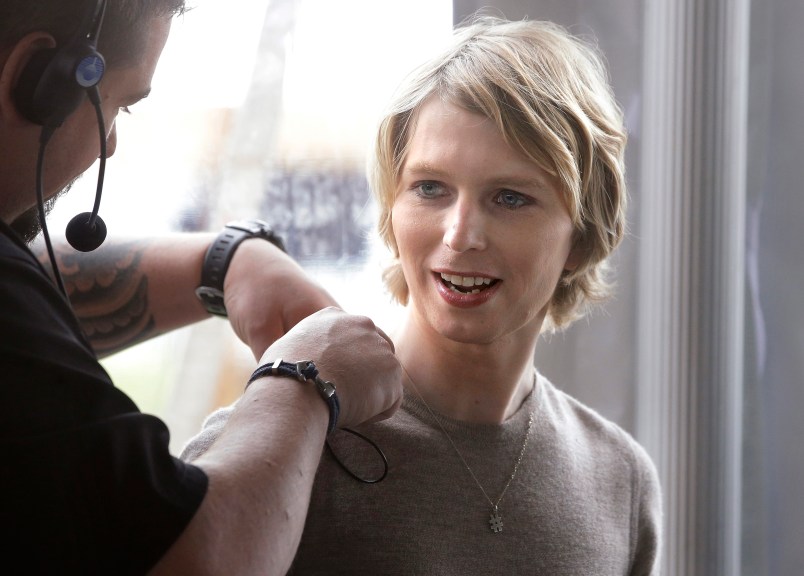NANTUCKET, Mass. (AP) — Chelsea Manning said Sunday she is not an “American traitor” as her critics have claimed, and that she did what she thought was right.
Manning made the remarks at a conference in Nantucket that was one of her first public appearances since being released for a military prison in May. The Associated Press was the only media outlet in attendance.
“I believe I did the best I could in my circumstances to make an ethical decision,” she told the crowd when asked by the moderator if she was a traitor.
The 29-year-old transgender woman was known as Bradley Manning when she was convicted in 2013 of leaking a trove of classified documents. She was released after serving seven years of a 35-year sentence, which was commuted by President Barack Obama in his final days in office.
Manning spoke at the annual conference for The Nantucket Project in Massachusetts, a venture founded to bring together creative thinkers to uncover ideas. Organizers say about 600 people attended.
Tom Scott, who co-founded The Nantucket Project with Kate Brosnan, said they invited Manning for “clarity of understanding.”
“My brother and father are Marines. They would respectfully challenge some of her decisions,” he said. “Barack Obama commuted her sentence. My instinct is that he’s a good and trustful man. How do those two things mix? Seeing her in person offers, perhaps, the best way to decipher that.”
Several audience members said they were intrigued to hear from Manning. Sara O’Reilly, a Nantucket resident who has attended several past conferences, said the speakers are typically a “little edgy.” She said she doesn’t judge Manning and other people have done “far worse” things. Bonnie Roseman, of West Palm Beach, Florida, said after the talk that Manning is courageous.
Scott said some people were upset that Manning was invited, but he didn’t consider retracting the invitation. Harvard University reversed its decision to name Manning a visiting fellow Friday, a day after CIA Director Mike Pompeo scrapped a planned appearance over the title for Manning. Pompeo called Manning an “American traitor.”
Manning said Harvard’s decision signaled to her that it’s a “police state” and it’s not possible to engage in actual political discourse in academic institutions.
“I’m not ashamed of being disinvited,” she said. “I view that just as much of an honored distinction as the fellowship itself.”
Eugene Jarecki, an award-winning documentary director, moderated the discussion. He asked Manning if it “reflects something about the state of our time” that she’s still the subject of pressure by the CIA on Harvard and labeled a traitor.
Manning said she took a risk to contribute to political and public discourse and “change the tone of the conversation,” but it hasn’t changed, and if anything, “things have gotten worse.”
“I’m walking out of prison and I see, literally, a dystopian novel unfolding before my eyes,” she said. “That’s how I feel when I walk in the American streets today.”
Manning also talked about the lack of privacy in today’s society, calling it “dead,” as well as the power of civil disobedience and the importance of forgiveness, saying “we should forgive everybody at some point.” She said she’ll keep speaking out.
“Everybody keeps telling me, ‘Maybe you shouldn’t say this. Maybe you shouldn’t do this event. Maybe you shouldn’t talk. Maybe you shouldn’t do this,'” she said. “And I’m just like, OK, the fact that you’re telling me I shouldn’t do this is the reason why I should. And I think that’s what we can all do.”
Scott said after that while he was still processing what Manning said, he thought it was a great conversation and a valuable use of their time.



